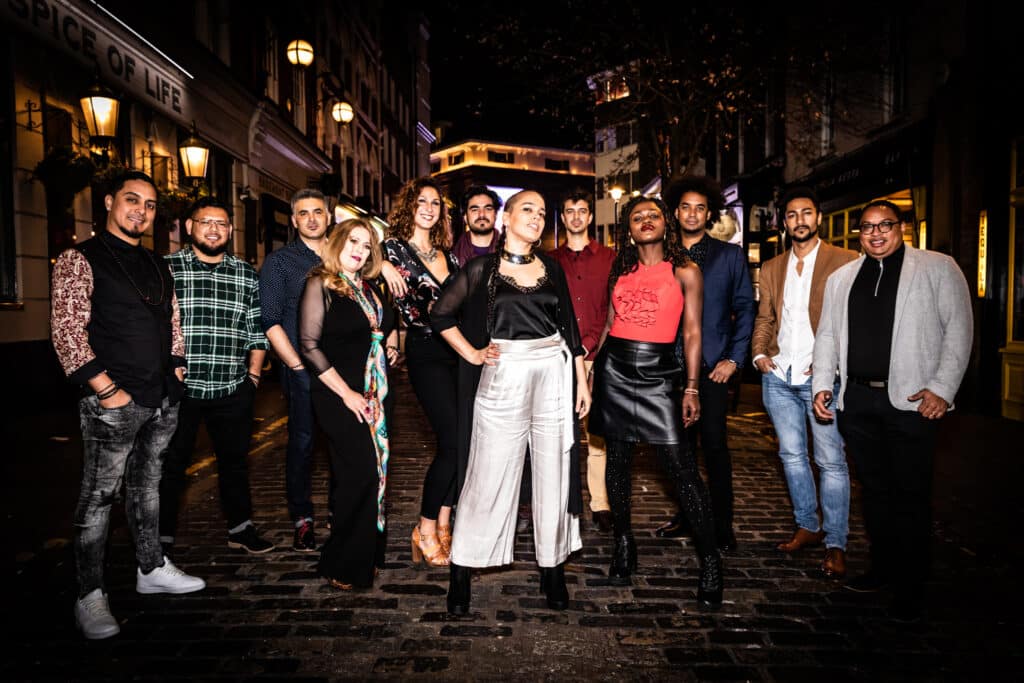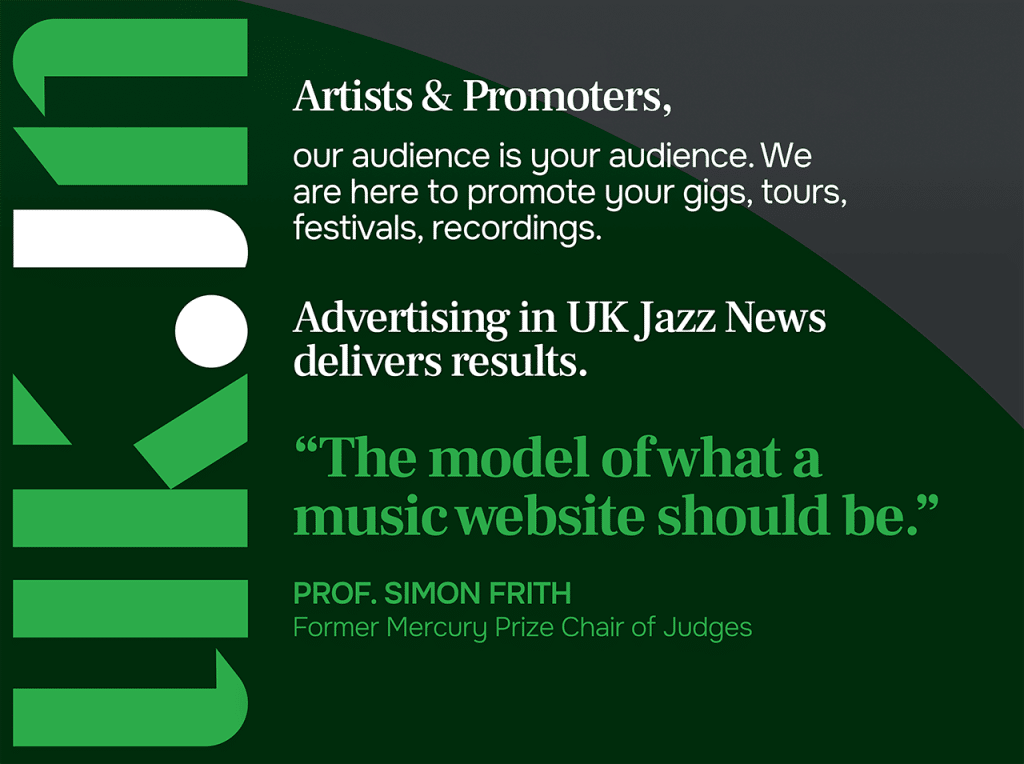Latinx powerhouse Eliane Correa is a composer, producer, MD, festival organiser, pianist and so much more. At the time of this interview for International Women’s Day she was, for example, touring as a soloist with the World of Hans Zimmer.
UKJazz News: I see you’ve been busy with many different projects since your 2022 album release Signo de Fuego. What are you working on at the moment?
EC: Signo de Fuego was a monster project, composition and arrangement-wise. Afterwards, I needed to focus on other people’s music for a while to recharge my batteries. I’ve been concentrating on projects which allow me to have a creative input but where I am not solely in charge, for once – and it’s been very refreshing. Currently I’m MDing for 19-piece mambo / latin jazz / early salsa orchestra New Regency Orchestra and for soulstress Elli Ingram. I’ve also been collaborating creatively with a range of artists such as Amyra León, Intervention and various theatre productions. I’ve received a grant from PRS Women Make Music to put together my next album, which will be a fairly abstract and experimental take on all things Afrocuban – probably my least “salsa-sounding,” most adventurous endeavour so far – but realistically the release won’t be until 2025. Meanwhile, I’ve teamed up with Barcelona-based Cuban vocalist Yadira Ferrer to bring to the UK a Cuban repertoire that has largely been skipped over and that represents our generation; it’s what we know as “música alternativa”, a mix of timba, jazz, funk and other genres that saw its peak in 2000-2015. We’ll be playing two shows on June 22nd at Pizza Express Jazz Club as an 8-piece. I’m also doing an assortment of Cuban-centric smaller shows here and there with my usual team.
UKJN: I understand you do plenty of touring. Are you away at the moment?
EC: I’m currently in Prague about to start a 2.5 month tour as a soloist with the World of Hans Zimmer. We have another 1.5 month tour towards the end of this year too. The rest of the time, I’m looking forward to playing my home scene in the UK with Elli, NRO and my own various projects.
UKJN: And how is the PhD going?
EC: It’s going! My PhD project looks to improve conditions and agency for musicians who play for tourists in urban areas of Spanish-speaking Latin America. The two cities I’m doing my main research in are both going through challenging moments politically. When your country and livelihood are, metaphorically speaking, on fire, whatever happens in or around tourism is not the priority, so I’ve decided to take it slow and let my research develop naturally. It’ll take longer than the 3 years I expected, but it means I get to research over a longer period of time than the present-day situations in Cuba and Argentina, and I can continue making music in the meantime.
UKJN: What do you do to recharge?
EC: I find it really hard to fully disconnect – I was quite the workaholic in my twenties so I have to be proactive about resting and recharging and still don’t do it anywhere near enough. Exercising, meditating and eating well are all important, but I feel like the most efficient recharge is a good day / night out with friends that I feel I can fully be myself around. I immigrated to the UK on my own and so did most of my close friends, so we are each other’s family. Humans are social animals, we need each other.
UKJN: Where do you get your inspiration when you are writing?
EC: I wish I had a wholesome answer for this but it’s not wholesome at all! Some of my composer friends take a candlelit bath, light some incense and meditate before they write, and then write from a place of peace and groundedness. I’ve tried everything but ultimately it seems like I can only write from a place of rage: if nothing makes me angry, the stuff I write feels like it doesn’t fully catalyse to the level of depth that I want. I think it’s important to accept these things and work with them rather than against them; the Taoists think of it as the Yin and Yang energies. Not everything flows like water from a place of elevated spirituality, and that’s ok; we need the balance between fire and water. I just write from a place of fire.
UKJN: You curate the London Latin Jazz Festival… What are your plans this year?
EC: We are very close to announcing this year’s lineup – I can’t reveal who will be on it just yet but there will be Brazilian funk-jazz fusion, new school flamenco-jazz, the usual improvised collab of Afro-Cuba Jazz Sessions, and more! I think we’ll be on sale by mid-April so keep your eyes peeled as the tickets tend to fly.
UKJN: Any gigs you would like to mention?
EC: Yes! Yadira Ferrer is coming to London to join our 8-piece band that pays homage to the Música Alternativa Cubana of 2000-2015 at Pizza Express Jazz Club on June 22nd. Then I will be at Glastonbury Festival headlining the Glasto Latino stage with my 12-piece Timba fusion orchestra La Evolución. And on August 22nd I’ll be with my Cuban Septet at the King’s Cross summer series playing a mix of originals, Cuban classics and modern covers. The London Latin Jazz Fest will run from October 8th until October 12th this year, and there will be some dates with the New Regency Orchestra announced soon as well.
UKJN: Have you always been a pianist or did something else come first?
EC: I don’t come from a family of musicians, but apparently I asked for a piano on my 3rd birthday and that was the beginning of everything. I haven’t always been a musician though, in my early years in London I pulled pints, mopped floors, walked dogs, worked in retail… My last job before being a full-time musician was working in tourism in Cuba, which is how I ended up with a PhD topic that centres North-to-South tourism.

UKJN: What is your take on International Women’s Day? How do you feel about gender in jazz and Latin music?
EC: I hope IWD is a stepping stone that will no longer be necessary a few generations down the line. In the meanwhile, every bit of progress that we make towards gender equality and making the existing issues visible is welcome, and should be celebrated. I think there is a long way to go, but I look at how gender is perceived in music work environments now and fifteen years ago and the change is there, it’s real and it’s noticeable. I wish there had been more women before me in Latin music in the UK that I could look up to and talk to and play with, especially women of Latinx heritage and/or non-cis-het women and femmes. Ultimately, every woman and femme musician is part of how change is created and I’m proud of being part of it, even if it wasn’t always easy earlier on.
The Latin music scene of the UK needs more women and femmes! I don’t usually teach, but since I would love to play with more women in my “home scene”, I occasionally offer discounted-rate workshops for musicians who are women, Latinxs, LGBTQIA+ and people of Global Majority ethnicities, who want to dive into the world of Latin music. The easiest way to find out more about this is by messaging me on my socials.
UKJN: What would you say to a young woman just starting out in the music industry?
EC: Get good at your craft, find what makes you unique and develop your artistry based on that; and don’t be afraid of being assertive and blowing your own horn a little. We women seem to struggle with taking up space sometimes, and gathering the confidence to speak up assertively; it’s part of how we’ve been socialised from a young age, and this ends up working against us in this highly competitive industry. You don’t have to know absolutely everything about everything and be 200% confident in order to “deserve” taking up a bit of space, having your conditions met, and having your voice heard. Even though progress has been made, we are still a minority and you will most definitely have some unpleasant encounters with The Patriarchy in any of its forms. It’s not always easy to deal with but we have to keep trying our best to not let this touch us so deeply that it affects our love for what we do. Also, I found that making friends with other female musicians was a game-changer, because we were able to voice our experiences and support each other.


